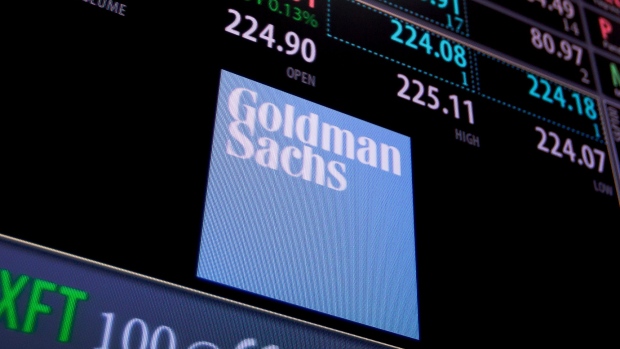Apr 15, 2019
Goldman falls as equity trading, banking backlog decline
, Bloomberg News

Goldman Sachs Group Inc. (GS.N) shares fell after the firm posted a bigger drop in equity trading than expected and warned that the investment-banking boost it got in the first quarter may not last.
The equity-trading slump led Goldman to a bigger decline in total trading revenue than at Citigroup Inc. or JPMorgan Chase & Co. While that was buffered by a surprise jump in deal fees, the company said its backlog of mergers and debt-underwriting transactions shrank from the end of 2018 as outstanding deals were completed.
Goldman’s new management team, led by Chief Executive Officer David Solomon, is getting closer to finishing a firmwide review that’s already led to changes in the trading operation, including scaling back some commodities businesses. This marked the second straight quarter that trading revenue steeply declined, which has hampered Solomon’s efforts to show more stable results.
The review may result in a shift in “focus and footprint” in some areas of fixed income, Chief Financial Officer Stephen Scherr said on a conference call with analysts. He said the firm remains committed to commodities.
Axel Pierron, managing director of capital markets management consultancy Opimas, said Goldman’s revenue stream “remains quite static” even though the firm has undertaken “an ambitious strategy to diversify the bank’s revenue streams from its core investment banking activities -- such as the launch of Marcus, its online banking service.”
Shares of Goldman Sachs, which jumped 24 per cent this year through Friday, fell 3.2 per cent at 9:53 a.m. in New York. The firm’s stock had staged a comeback this year after cratering toward the end of 2018 amid growing concern over the firm’s role in a Malaysian corruption scandal and tumult in the market in December.
‘Softer Than Expected’
Goldman shares rallied 2.5 per cent Friday after JPMorgan reported first-quarter results that included a smaller drop in trading than expected.
Revenue at Goldman “was a little bit softer than expected,” said Devin Ryan, an analyst with JMP Securities. “They did beat on earnings per share, but that’s in expenses and taxes, but those are areas people are going to question how much of that will sustain as the year progresses.”
Goldman’s traders, who bring in the firm’s biggest chunk of revenue, posted an 18 per cent drop in revenue to US$3.61 billion, in line with the average analyst estimate. Citigroup Inc., which also posted first-quarter results on Monday, said trading revenue dropped just 5.2 per cent after its bond traders turned in a surprise gain of 1 per cent.
Investment-banking revenue at Goldman rose 1 per cent to US$1.8 billion for the quarter, compared with the average estimate of a 5 per cent decline to US$1.7 billion. Merger advisory surged 51 per cent and a drop in equity underwriting was smaller than analysts predicted, even as some companies had to delay plans to go public because of the shutdown.
The second-quarter results will probably get a boost from Goldman’s role in helping Uber Technologies Inc. go public, with that listing expected next month.
Goldman Sachs ranked No. 2 by market share for M&A advisory during the first quarter, behind JPMorgan Chase & Co., but topped the bigger bank in fees, according to data compiled by Bloomberg. Goldman worked on multibillion-dollar deals including advising WellCare Health Plans Inc. on its US$17.3 billion acquisition by Centene Corp., Fidelity National Information Services Inc.’s US$34 billion purchase of Worldpay Inc. and SunTrust Banks Inc. on its US$28 billion deal to combine with BB&T Corp.
“We are pleased with our performance in the first quarter, especially in the context of a muted start to the year,” Solomon said in a statement.
The firm said it’s seeking out new markets for the banking unit, in line with its push recently to do more business with smaller companies -- a market it previously neglected.
Other key results:
- Net income fell 21 per cent to US$2.25 billion, or $5.71 a share, compared with the estimate of US$4.97. Revenue fell 13 per cent to US$8.81 billion as the firm’s investing and lending and asset-management both posted declines.


